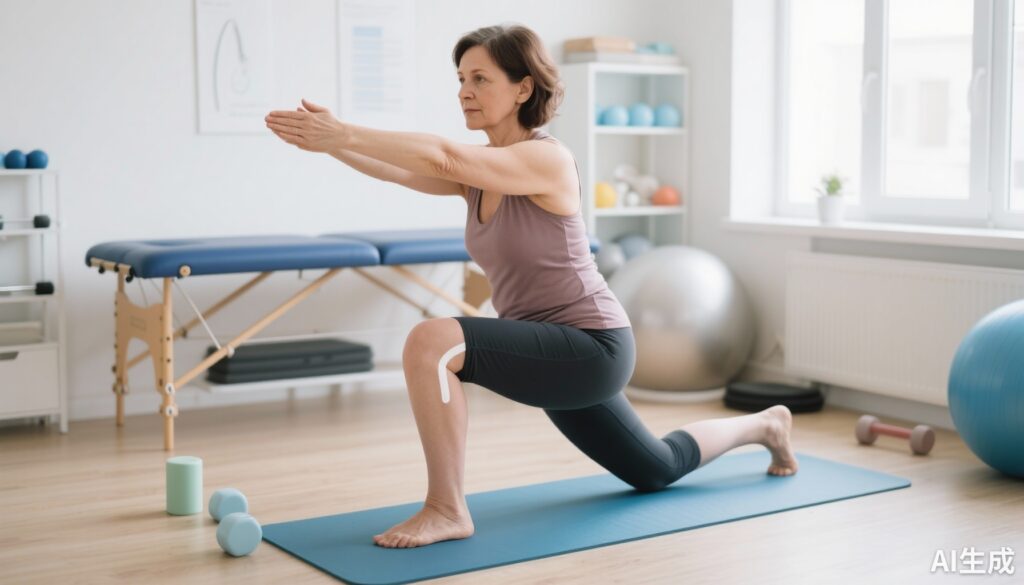Highlight
Recent meta-analysis assessing Pilates in knee osteoarthritis (KOA) shows potential benefits in pain relief and functional improvement, with no clear impact on knee range of motion (ROM). Safety data remains limited due to underreporting of adverse events. The overall evidence quality is very low to low, necessitating cautious clinical interpretation.
Study Background
Knee osteoarthritis (KOA) is a highly prevalent degenerative joint disease leading to chronic pain, functional impairment, and reduced quality of life worldwide. Non-pharmacologic interventions including exercise therapies are cornerstones of KOA management to reduce symptoms and improve mobility. Pilates, a mind-body exercise emphasizing core stability, controlled movement, and muscular balance, has been proposed as a therapeutic option for KOA patients. Despite anecdotal and small-scale trial evidence suggesting benefits, the clinical efficacy and safety profile of Pilates in KOA remains inadequately defined. This review addresses an important gap by systematically assessing the available randomized controlled trial (RCT) evidence regarding Pilates’ role in KOA management.
Study Design
This systematic review and meta-analysis incorporated eight RCTs encompassing 322 participants diagnosed with knee osteoarthritis. Searches were comprehensive, covering PubMed, Web of Science, EMBASE, the Cochrane Library, and Google Scholar up to May 21, 2024. The intervention under study was Pilates exercise, compared against various control groups including blank controls (no intervention), health education, and other exercise modalities.
Primary outcomes assessed were pain measured by the Visual Analogue Scale (VAS), physical function evaluated by the Western Ontario and McMaster Universities Osteoarthritis Index (WOMAC), knee range of motion (ROM), and reported adverse events to assess safety. Risk of bias was evaluated, with attention to blinding issues typical in exercise trials. The Grading of Recommendations Assessment, Development and Evaluation (GRADE) approach was used to appraise evidence certainty. Subgroup and sensitivity analyses, as well as publication bias investigation via funnel plots and Egger’s tests, were conducted to ensure robustness.
Key Findings
The meta-analysis revealed that when compared to blank controls, Pilates demonstrated a statistically significant reduction in WOMAC scores with a standardized mean difference (SMD) of -1.70 (95% confidence interval [CI]: -3.14 to -0.25), indicating improvement in pain and physical function. However, heterogeneity among studies was high, which impacts confidence.
In a single RCT contrasting Pilates to health education, Pilates significantly lowered VAS pain scores (mean difference [MD] = -1.74; 95% CI: -2.51 to -0.97) and WOMAC scores (SMD = -1.42; 95% CI: -2.39 to -0.45). This study did not find significant changes in knee ROM following Pilates intervention.
Comparisons between Pilates and other exercise interventions revealed no statistically significant differences across VAS, WOMAC, or ROM outcomes, suggesting Pilates performs comparably rather than superiorly in these dimensions.
Importantly, no adverse events were reported in the included trials; however, active monitoring was limited and safety conclusions are therefore tentative.
Assessment of publication bias revealed asymmetry in funnel plots for VAS and WOMAC, with Egger’s tests indicating possible bias (p=0.0039 and 0.0154 respectively). The quality of evidence assessed by GRADE was “very low” for pain and function outcomes and “low” for knee ROM, limiting the strength of clinical recommendations.
Expert Commentary
Given the multifactorial nature of KOA and chronic pain syndromes, the potential of Pilates to improve symptoms via enhanced neuromuscular control, postural alignment, and muscle strength is biologically plausible. The controlled, low-impact exercise environment may offer a tolerable option for patients with physical limitations. However, the diversity in Pilates protocols, small sample sizes, and limited standardization of intervention dose and duration among the trials challenge the generalizability of findings.
The lack of blinding and potential selective reporting bias, common in exercise RCTs, also temper confidence. Furthermore, no trial systematically assessed mental health outcomes, which could be relevant given Pilates’ holistic approach. Future research ideally should integrate objective biomechanical assessments, standardized protocols, and longer follow-up to evaluate sustained benefits and adherence.
Conclusion
This meta-analysis suggests that Pilates may be beneficial in reducing pain and improving physical function in patients with knee osteoarthritis, with negligible effect on knee range of motion. The safety profile cannot be conclusively established due to insufficient adverse event reporting. Current evidence is limited by methodological concerns, heterogeneity, moderate to high risk of bias, and potential publication bias, urging cautious interpretation.
Clinicians considering Pilates for KOA should weigh these limitations, integrate individual patient preferences, and consider Pilates as part of a comprehensive multimodal management strategy. There remains a clear need for large, high-quality RCTs utilizing standardized Pilates protocols, with explicit safety monitoring and exploration of longer-term outcomes including psychological well-being.
Funding and Trial Registration
The reviewed article, authored by Zhang et al., was published in Annals of Medicine in December 2025 (PMID: 40781878). No specific funding or clinicaltrials.gov registration was reported within the meta-analysis.
References
Zhang K, Li Y, Zhao F, Xie X, Yan S, Kong D, Zhang W, Zhou J, Ma H. The efficacy and safety of pilates exercise in patients with knee osteoarthritis: a systematic review with meta-analysis of randomized controlled trials. Ann Med. 2025 Dec;57(1):2540616. doi: 10.1080/07853890.2025.2540616. PMID: 40781878; PMCID: PMC12337744.
Hunter DJ, Bierma-Zeinstra S. Osteoarthritis. Lancet. 2019;393(10182):1745-1759. doi:10.1016/S0140-6736(19)30417-9
Fransen M, McConnell S, Harmer AR, Van der Esch M, Simic M, Bennell KL. Exercise for osteoarthritis of the knee. Cochrane Database Syst Rev. 2015;2015(1):CD004376. doi:10.1002/14651858.CD004376.pub3

